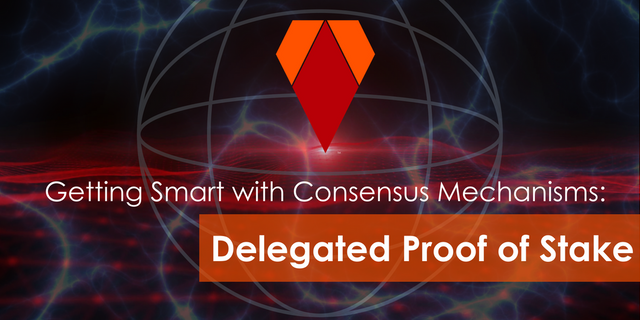Getting Smart With Consensus Mechanisms: Delegated Proof of Stake

For the last blog in our series, we’ll explore the fastest, most scalable blockchain consensus that exists today: Delegated Proof of Stake.
Delegated Proof of Stake, otherwise known as DPoS, was invented in 2013, by Dan Larimer. It was originally made to power Bitshares, but since it’s success, it has been implemented in several blockchains. The second blockchain to employ the DPoS consensus, was STEEM – Which is powering the very article you’re reading right now! This consensus protocol is revered by communities, to have the highest level of decentralization possible. It’s also widely agreed upon, that it’s the most secure as well – And we’ll explain why.
How does Delegated Proof of Stake work?
Delegated Proof of Stake has many similarities to PoS, which we covered previously. There are far more differences though. The biggest, and perhaps most important difference, is that all token holders decide who will produce blocks. Rather than a small handful of people holding the power to make changes to the network or having the chance to produce blocks - Every token holder has a right to vote on these processes. This is because blocks are produced by delegated witnesses. Witnesses are individuals who are voted on by the community to validate transactions, and produce blocks. The candidates that get the most votes by the community, are the ones who get to produce blocks. This creates a true representative democracy. They can be voted in or out, at any time. If a witness isn’t performing well, the community has the power to essentially fire them.
In a Delegated Proof of Stake system, token holders call all the shots. No matter how few, or how many tokens you hold, you can vote on every aspect of the network. Although you vote on witnesses to secure the network, they aren’t the ones that that control network changes. Those are voted on by token holders too. Once most delegates agree on a proposed change, there’s a review period in which stakeholders have the chance to vote out witnesses and repeal the proposed changes if they want to. This process assures that token holders have the final say. Technically, witnesses hold no power over the network at all.
Duties of Witnesses Include:
• Making sure their node is always up and running.
• Collecting transactions into blocks.
• Signing and broadcasting the blocks to the rest of the network.
• Validating transactions.
Being a Witness Does Have Its Perks
As a miner in other networks, such as PoW and PoS, you receive rewards for your services in some way. The same goes for witnesses in a DPoS system, but that too is determined by stakeholders, through the delegates. Any proposed changes to this protocol, must go through the review period, remember? So essentially, you as the stakeholder, decide how much these delegates are paid. In the majority of DPoS systems, witnesses are chosen randomly from the elected delegates to produce blocks. This leaves predicting the next block producer virtually impossible and keeps the process fair for all.
The Advantages of Delegated Proof of Stake:
• Faster block times. The STEEM blockchain currently produces one block about every 2 seconds!
• Speed of transactions. Since blocks are produced so quickly, transactions are nearly instant. Theoretically, over 180,000 transactions can be processes per second.
• Highly decentralized. Since all token holders can vote on every single aspect of the network, no one is excluded.
• Highly secure. Creator of DPoS, Dan Larimer, has stated "there are no known strategies by which a well connecting full validating node can be defrauded"
But there must be a downside, right?
There’s been some lengthy discussions regarding the Delegated Proof of Stake system, and its possible downsides. But what matters most in terms of blockchain protocols, is of course performance. Delegated Proof of Stake systems consistently outperform all others, processing more transactions, at higher speeds, at only a fraction of their full capacity. You’ll be hard pressed to find any real issues with the system in terms of performance.
Delegated Proof of Stake is the Best Solution
The Vice Industry Token blockchain, will run on a very similar protocol as the STEEM blockchain. In an industry that’s accountable for about a third of all internet traffic, scalability is essential. We’re only a short time away, from implementing the world’s biggest stress test on this consensus mechanism. STEEM recently celebrated one million transactions per day, using very little capacity. Top tube sites boast over 80 Million visits per day. With only our current network of affiliated sites, potential connected users are in the hundreds of millions – And we’re adding more every week. This system is about to see the ultimate test, and we’re confident in it’s ability to perform on a massive global scale.

Connect with us on social media!
Twitter
Facebook
Instagram
Tumblr
Medium
Reddit
Telegram
Global Communities